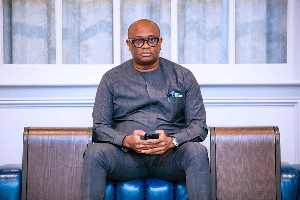By Kwame Okoampa-Ahoofe, Jr., Ph.D.
Naturally, I read the article titled “Nkrumah’s Son Slams Nana Addo” (See Ghanaweb.com 6/30/12) with utmost contempt. First of all, while he vainly copycatted the statally planned economic strategy of the erstwhile Soviet Union (USSR), i.e. the so-called Seven-Year Development Plan, in reality, President Nkrumah’s attempt to industrialize Ghana’s economy was primarily and inescapably borrowed from the industrial-capitalist playbook of the United States of America; and so was his Garveyite pan-Africanist agenda. And it would be the very Americans whom he publicly pretended to loathe and disdain that the Show Boy would hypocritically turn to for the massive funding of his single most important project, namely, the Volta Hydroelectric Scheme.
And so, precisely, what is the psychologically alienated, Arabo-Egyptian Mr. Gamal Nkrumah talking about? Needless to say, it is perfectly understandable that the Egyptian Mr. Nkrumah finds it rather extremely difficult and, perhaps, even virtually impossible to get over the auspicious fact of the landmark overthrow of his father’s neo-fascist and neo-Nazi regime of the so-called Convention People’s Party (CPP). And, of course, just like this writer, the Egyptian Mr. Nkrumah has every right to comment on political developments in any part of the globe, especially on events pertaining to the African continent. Nevertheless, even as the Trokosi Editors of Ghana’s Herald newspaper rightly observed, the Cairo-based journalist does far better commenting on Maghrebian and Arab world affairs.
We must also, once again, highlight for the necessary enlightenment of those impressionable and young Ghanaians who may not know this, that it was Mr. William (Paa Willie) Ofori-Atta, and not the late President Nkrumah, who verifiably first proposed the strategically imperative policy of Free Education (See The Working Papers of the Gold Coast Youth Conference; also Danquah’s The Voice of Prophecy). To be certain, at least 15 years prior to the founding of the seminal United Gold Coast Convention (UGCC), and nearly 20 years before Nkrumah’s breakaway Convention People’s Party assumed a dominant status on the Ghanaian political landscape, the development policy of Free Education was widely advocated by Dr. J. B. Danquah and his political and ideological associates.
We must also remember that as relatively early as 1932, or slightly thereafter, Mr. William Ofori-Atta, the first School Prefect and former tutor at Achimota College, had assumed headmastership of the Abuakwa State College (ABUSCO), which institution was primarily established as an indigenous Ghanaian means of accelerating enlightenment and scholarship in the erstwhile Gold Coast – already in operation, of course, was the Cape Coast-based Mfantsipim School (Kwabotwe) since 1876.
In other words, the notion that social interventionist policies like Free Education is mutually exclusive to industrial-capitalist-oriented ideology, is arrant nonsense. Does the Egyptian Mr. Nkrumah, for instance, know anything about the perennial Free-Education policies of Western post-industrial countries like the United States, Britain and Canada? And would he brazenly dare to claim that the foregoing Free-Education policies are borrowings from the socialist countries?
In any case, while he is more than equal to the task of vigorously defending himself against the editorial detractors of the Herald newspaper, nonetheless, suffice it here to observe, at least in passing, that the cheap and tawdry attempt to linking Mr. Sekou Nkrumah’s personal political fortunes with the stark and incontrovertible reality of Ghanaian and global history is one that glaringly exposes the Herald’s editors for what they veritably are – which is incorrigible cynics and nescient scam-artists whose thoughts and vulgar political effusions are not worth the price of the paper on which the Herald printed.
*Kwame Okoampa-Ahoofe, Jr., Ph.D., is Associate Professor of English, Journalism and Creative Writing at Nassau Community College of the State University of New York, Garden City. He is Director of The Sintim-Aboagye Center for Politics and Culture and author of “Dr. J. B. Danquah: Architect of Modern Ghana”(iUniverse.com, 2005). E-mail: okoampaahoofe@optimum.net.
###
Opinions of Monday, 2 July 2012
Columnist: Okoampa-Ahoofe, Kwame
Gamal Nkrumah Is Irrelevant To Ghanaian Politics
Entertainment













